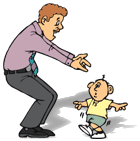|
Growing evidence suggests that simple exercises can help babies
grow and stay healthy - even when administered in the first
few weeks of life. Consider a recent study involving 24 infants;
if the results are any indication, preventing bone-thinning
ailments, such as osteopenia, may be as simple as providing
flexion, extension and nurturing.
A team of Israeli researchers matched low-birth-weight infants
of similar development (4-7 days after birth) and divided
them into an exercise group and a control group of 12 infants
apiece. Growth rate and characteristics of bones, such as
strength, were measured at enrollment (during the first week
of life) and at four weeks.
 Infants
in the exercise group received regular five-minute sessions
of flexion and extension at various joints, five times a week
for four weeks; infants in the control group received similar-length
periods of holding and stroking, but without range-of-motion
activity. Although physical activity did not appear to influence
bone formation, bone density remained stable in the exercise
group while decreasing significantly in the control group.
W Infants
in the exercise group received regular five-minute sessions
of flexion and extension at various joints, five times a week
for four weeks; infants in the control group received similar-length
periods of holding and stroking, but without range-of-motion
activity. Although physical activity did not appear to influence
bone formation, bone density remained stable in the exercise
group while decreasing significantly in the control group.
W
hile this a very small sampling, and infants are not the
easiest subjects to physically evaluate, results point to
what many health care providers have been saying all along:
Exercise - at whatever age and whatever amount - can positively
impact a number of health conditions, including bone density.
It's also important to note that flexion and extension are
common techniques utilized by chiropractors in the clinical
setting.
Reference:
Litmanovitz I, Dolfin T, Friedland O, et al.
Early physical activity intervention prevents decrease of
bone strength in very low birth weight infants. Pediatrics
July 2003: Volume 112, Number 1, pp.15-19.
To learn more about pediatric health, go to www.chiroweb.com/find/archives/pediatrics.
|



